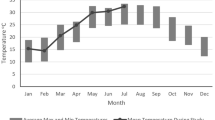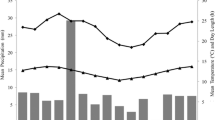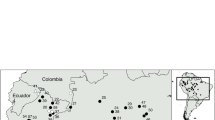Abstract
Folivorous primates are typically considered time minimizers because the constraints of their unique digestive systems require them to spend a large portion of their activity budgets resting. However, inter- and intraspecific behavioral variation in their activity budgets may be influenced by local geographic and climatic conditions and evolutionary history. We compiled 48 studies representing ten genera, 31 species, and 50 populations to assess geographic (elevation, latitude), climatic (precipitation, temperature), and phylogenetic correlates of colobine activity budgets. Time spent resting negatively correlated with time spent feeding, moving, and socializing. Except for time spent socializing, activity budgets were independent of phylogeny, with more time spent feeding and less time resting in higher-elevation habitats and at lower temperatures. Among the four most common genera in our sample, only in Rhinopithecus did time spent feeding increase with higher elevations (range, 950–3950 m above mean sea level) and lower temperatures (range, 0.9–25 ℃). Only in Trachypithecus did time spent resting decrease with lower temperatures (range, 19–25 ℃). Our findings suggest that there are no apparent effects of geographic or climatic gradients on colobine activity budgets except for Rhinopithecus and Trachypithecus, whose activities are biased in favor of energy maximization rather than time minimization. Compared with other colobines, the ability of Rhinopithecus to adapt their activity budget at high elevations may make them less vulnerable to climate change, while the greater sensitivity of Trachypithecus to heat may make them more vulnerable to climate change.


Similar content being viewed by others
References
Altman J (1980) Baboon mothers and infants. Harvard University Press, Cambridge
Arseneau-Robar TJM, Changasi AH, Turner E, Teichroeb JA (2021) Diet and activity budget in Colobus angolensis ruwenzorii at Nabugabo, Uganda: are they energy maximizers? Folia Primatol 92:35–48. https://doi.org/10.1159/000511046
Barton K (2020) MuMIn: Multi-Model Inference. R package version 1.43.17. https://CRAN.R-project.org/package=MuMIn
Beeby N, Baden AL (2021) Seasonal variability in the diet and feeding ecology of black-and-white ruffed lemurs (Varecia variegata) in Ranomafana National Park, southeastern Madagascar. Am J Phys Anthropol 174:763–775. https://doi.org/10.1002/ajpa.24230
Berry WD, Feldman S (1985) Multiple regression in practice (quantitative applications in the social sciences). SAGE publications, Thousand Oaks CA
Bethge J, Wist B, Stalenberg E, Dausmann K (2017) Seasonal adaptations in energy budgeting in the primate Lepilemur leucopus. J Comp Physiol B Biochem Syst Environ Physiol 187:827–834. https://doi.org/10.1007/s00360-017-1082-9
Bicca-Marques JC, Calegaro-Marques C (1998) Behavioral thermoregulation in a sexually and developmentally dichromatic neotropical primate, the black-and-gold howling monkey (Alouatta caraya). Am J Phys Anthropol 546:533–546
Burnham KP, Anderson DR (2002) Model selection and multimodel inference: a practical information-theoretic approach. Springer-Verlag, New York
Chivers D (1994) Functional anatomy of the gastrointestinal tract. In: Davies G, Oates J (eds) Colobine monkeys: their ecology, behaviour and evolution. Cambridge University Press, Cambridge, pp 205–228
Cinar O, Umbanhowar J, Hoeksema JD, Viechtbauer W (2021) Using information-theoretic approaches for model selection in meta-analysis. Res Synth Methods 12:537–556. https://doi.org/10.1002/jrsm.1489
Clutton-Brock TH, Harvey PH (1977) Primate ecology and social organization. J Zool 183:1–39
Dunbar RIM (1992a) A model of the gelada socio-ecological system. Primates 33:69–83. https://doi.org/10.1007/BF02382763
Dunbar RIM (1992b) Time: a hidden constraint on the behavioural ecology of baboons. Behav Ecol Sociobiol 31:35–49. https://doi.org/10.1007/bf00167814
Dunbar RIM, Dunbar P (1988) Maternal time budgets of gelada baboons. Anim Behav 36:970–980. https://doi.org/10.1016/S0003-3472(88)80055-1
Dunbar RIM, Korstjens AH, Lehmann J (2009) Time as an ecological constraint. Biol Rev 84:413–429. https://doi.org/10.1111/j.1469-185X.2009.00080.x
Ehlers Smith DA, Ehlers Smith YC, Cheyne SM (2013) Home-range use and activity patterns of the red langur (Presbytis rubicunda) in Sabangau Tropical Peat-Swamp Forest, Central Kalimantan, Indonesian Borneo. Int J Primatol 34:957–972. https://doi.org/10.1007/s10764-013-9715-7
Eppley TM, Watzek J, Dausmann KH et al (2017) Huddling is more important than rest site selection for thermoregulation in southern bamboo lemurs. Anim Behav 127:153–161. https://doi.org/10.1016/j.anbehav.2017.03.019
Estrada A, Garber PA, Rylands AB et al (2017) Impending extinction crisis of the world’s primates: Why primates matter. Adv Sci 3:1–16. https://doi.org/10.1126/sciadv.1600946
Fan PF, Ni QY, Sun GZ et al (2008) Seasonal variations in the activity budget of Nomascus concolor jingdongensis at Mt. Wuliang, Central Yunnan, China: effects of diet and temperature. Int J Primatol 29:1047–1057. https://doi.org/10.1007/s10764-008-9256-7
Fashing PJ (1999) The behavioral ecology of an African colobine monkey: diet, range use, and patterns of intergroup aggression in eastern black and white colobus monkeys (Colobus guereza), PhD Dissertation. Columbia University
Felsenstein J (1985) Phylogenies and the comparative method. Am Nat 125:1–15
Fick SE, Hijmans RJ (2017) WorldClim 2: new 1-km spatial resolution climate surfaces for global land areas. Int J Climatol 37:4302–4315. https://doi.org/10.1002/joc.5086
Ganas J, Robbins MM (2005) Ranging behavior of the mountain gorillas (Gorilla beringei beringei) in Bwindi Impenetrable National Park, Uganda: A test of the ecological constraints model. Behav Ecol Sociobiol 58:277–288. https://doi.org/10.1007/s00265-005-0920-z
Garber PA (1987) Foraging strategies among living primates. Annu Rev Anthropol 16:339–364. https://doi.org/10.1146/annurev.an.16.100187.002011
Grafen A (1989) The phylogenetic regression. Philos Trans R Soc B 326:119–157. https://doi.org/10.1098/rstb.1989.0106
Grueber CE, Nakagawa S, Laws RJ, Jamieson IG (2011) Multimodel inference in ecology and evolution: challenges and solutions. J Evol Biol 24:699–711. https://doi.org/10.1111/j.1420-9101.2010.02210.x
Grueter CC (2013) The biology of snub-nosed monkeys, douc langurs, proboscus monkeys, and simakobus. Nova science publishers, New York
Grueter CC, Li D, Ren B et al (2009) Fallback foods of temperate-living primates: a case study on snub-nosed monkeys. Am J Phys Anthropol 140:700–715. https://doi.org/10.1002/ajpa.21024
Grueter CC, Li D, Ren B et al (2012) Food abundance is the main determinant of high-altitude range use in snub-nosed monkeys. Int J Zool. https://doi.org/10.1155/2012/739419
Grueter CC, Li D, Ren B, Li M (2013) Overwintering strategy of Yunnan snub-nosed monkeys: adjustments in activity scheduling and foraging patterns. Primates 54:125–135. https://doi.org/10.1007/s10329-012-0333-3
Guo S, Li B, Watanabe K (2007) Diet and activity budget of Rhinopithecus roxellana in the Qinling Mountains, China. Primates 48:268–276. https://doi.org/10.1007/s10329-007-0048-z
Hanya G (2004) Seasonal variations in the activity budget of Japanese macaques in the coniferous forest of Yakushima: effects of food and temperature. Am J Primatol 63:165–177. https://doi.org/10.1002/ajp.20049
Harrison S (2020) Plant community diversity will decline more than increase under climatic warming. Philos Trans R Soc B Biol Sci. https://doi.org/10.1098/rstb.2019.0106
Hixon MA (1982) Energy maximizers and time minimizers: theory and reality. Am Nat 119:596–599. https://doi.org/10.1086/283937
Ho LST, Ané C (2014) A linear-time algorithm for gaussian and non-gaussian trait evolution models. Syst Biol 63:397–408. https://doi.org/10.1093/sysbio/syu005
Hurvich CM, Tsai CL (1989) Regression and time series model selection in small samples. Biometrika 76:297–307. https://doi.org/10.1093/biomet/76.2.297
Ives AR (2015) For testing the significance of regression coefficients, go ahead and log-transform count data. Methods Ecol Evol 6:828–835. https://doi.org/10.1111/2041-210X.12386
Ives AR (2018) Mixed and phylogenetic models: a conceptual introduction to correlated data. https://leanpub.com/correlateddata
Ives AR, Zhu J (2006) Statistics for correlated data: phylogenies, space, and time. Ecol Appl 16:20–32
Iwamoto T, Dunbar RIM (1983) Thermoregulation, habitat quality and the behavioural ecology of gelada baboons. J Anim Ecol 52:357–366
Kamilar JM, Cooper N (2013) Phylogenetic signal in primate behaviour, ecology and life history. Philos Trans R Soc B. https://doi.org/10.1098/rstb.2012.0341
Kay RB, Davies AG (1994) Digestive Physiology. In: Davies AG, Oates JF (eds) Colobine Monkeys: their ecology, behaviour and evolution. Cambridge University Press, pp 229–250
Kirkpatrick RC (1996) Ecology and Behavior of the Yunnan Snub-Nosed Langur (Rhinopithecus bieti, Colobinae), PhD Dissertation. University of California-Davis
Korstjens AH, Dunbar RIM (2007) Time constraints limit group sizes and distribution in red and black-and-white colobus. Int J Primatol 28:551–575. https://doi.org/10.1007/s10764-007-9148-2
Korstjens AH, Verhoeckx IL, Dunbar RIM (2006) Time as a constraint on group size in spider monkeys. Behav Ecol Sociobiol 60:683–694. https://doi.org/10.1007/s00265-006-0212-2
Korstjens AH, Lehmann J, Dunbar RIM (2010) Resting time as an ecological constraint on primate biogeography. Anim Behav 79:361–374. https://doi.org/10.1016/j.anbehav.2009.11.012
Korstjens AH, Lehmann J, Dunbar RIM (2018) Time constraints do not limit group size in arboreal guenons but do explain community size and distribution patterns. Int J Primatol 39:511–531. https://doi.org/10.1007/s10764-018-0048-4
Kumar S, Stecher G, Suleski M, Hedges SB (2017) TimeTree: a resource for timelines, timetrees, and divergence times. Mol Biol Evol 34:1812–1819. https://doi.org/10.1093/molbev/msx116
Legates DR, Willmott CJ (1990a) Mean seasonal and spatial variability in global surface air temperature. Theor Appl Climatol 41:11–21
Legates DR, Willmott CJ (1990b) Mean seasonal and spatial variability in gauge-corrected, global precipitation. Int J 10:111–127
Lehman SM (2008) Effects of altitude on the conservation biogeography of lemurs in SouthEast Madagascar. In: Grow NB, Sharon G-D, Krzton A (eds) High altitude primates. Springer, New York, pp 23–42
Lehmann J, Korstjens AH, Dunbar RRIM (2008) Time and distribution: a model of ape biogeography. Ethol Ecol Evol 20:337–359. https://doi.org/10.1080/08927014.2008.9522516
Li Y (2009) Activity budgets in a group of Sichuan snub-nosed monkeys in Shennongjia nature reserve, China. Curr Zool 55:173–179
Linacre E, Geerts B (1997) Climates and weather explained. Routledge, New York
Liu X (2012) Behavioral Ecology of the Sichuan Snub-nosed Monkey (Rhinopithecus roxellana) in Shennongjia, China, PhD Dissertation. University of Southern California
Long HT, Tinh NT, Tran HV, Minh HT (2010) Activity budget of grey-shanked douc langurs (Pygathrix cinerea) in Kon Ka Kinh National Park. Vietnam Vietnamese J Primatol 4:27–39
Marshall AJ, Wrangham RW (2007) Evolutionary consequences of fallback foods. Int J Primatol 28:1219–1235. https://doi.org/10.1007/s10764-007-9218-5
Matsuda I, Tuuga A, Higashi S (2009) The feeding ecology and activity budget of proboscis monkeys. Am J Primatol 71:478–492. https://doi.org/10.1002/ajp.20677
Matsuda I, Chapman CA, Clauss M (2019) Colobine forestomach anatomy and diet. J Morphol 280:1608–1616. https://doi.org/10.1002/jmor.21052
Milton K, May ML (1976) Body weight, diet and home range area in primates. Nature 259:459–462. https://doi.org/10.1038/259459a0
Minhas RA, Ahmed KB, Awan MS, Dar NI (2010) Social organization and reproductive biology of Himalayan grey langur (Semnopithecus entellus ajex) in Machiara National Park, Azad Kashmir (Pakistan). Pak J Zool 42:143–156. https://doi.org/10.3724/sp.j.1141.2010.02177
Oates JF, Davies AG, Delson E (1994) The diversity of living colobines. In: Davies AG, Oates JF (eds) Colobine Monkeys: their ecology, behaviour and evolution. Cambridge University Press, Cambridge, pp 45–74
Ossi K, Kamilar JM (2006) Environmental and phylogenetic correlates of Eulemur behavior and ecology (Primates: Lemuridae). Behav Ecol Sociobiol 61:53–64. https://doi.org/10.1007/s00265-006-0236-7
Ostrofsky KR, Robbins MM (2020) Fruit-feeding and activity patterns of mountain gorillas (Gorilla beringei beringei) in Bwindi Impenetrable National Park, Uganda. Am J Phys Anthropol 173:3–20. https://doi.org/10.1002/ajpa.24056
Pagel M (1999) Inferring the historical patterns of biological evolution. Nature 401:877–884
Porter WP, Gates DM (1969) Thermodynamic equilibria of animals with environment. Ecol Monogr 39:227–244
R Core Team (2021) R: a language and environment for statistical computing. R Foundation for Statistical Computing, Vienna, Austria
Roos C (2022) Taxonomic Classification of Colobine Monkeys. In: Matsuda I, Grueter CC, Teichroeb JA (eds) The colobines: natural history, behaviour, and ecological diversity. Cambridge University Press, Cambridge, pp 3–12
Rosenberger AL, Strier KB (1989) Adaptive radiation of the ateline primates. J Hum Evol 18:717–750. https://doi.org/10.1016/0047-2484(89)90102-4
Ruhiyat Y (1983) Socio-ecological study of Presbytis aygula in West Java. Primates 24:344–359. https://doi.org/10.1007/BF02381980
Sangchantr S (2004) Social organization and ecology of Mentawai leaf monkeys, PhD Dissertation. Columbia University
Schoener TW (1971) Theory of feeding strategies. Annu Rev Ecol Syst 2:369–404
Schoener TW (1969) Optimal size and specialization in constant and fluctuating environments: an energy-time approach. Brookhaven Symp Biol 22:103–114
Silver SC, Marsh LK (2003) Dietary Flexibility, Behavioral Plasticity, and Survival in Fragments: Lessons from Translocated Howlers. In: Marsh LK (ed) Primates in fragments: ecology and conservation. Kluwer Academic/Plenum Publishers, New York, pp 251–265
Strier KB (2009) Seeing the forest through the seeds. Curr Anthropol 50:213–228. https://doi.org/10.1086/592026
Strier KB (2017) What does variation in primate behavior mean? Am J Phys Anthropol 162:4–14. https://doi.org/10.1002/ajpa.23143
Symonds MRE, Blomberg SP (2014) A Primer on Phylogenetic Generalised Least Squares. In: Zsolt GL (ed) Modern phylogenetic comparative methods and their application in evolutionary biology. Springer-Verlag, pp 105–130
Symonds MRE, Moussalli A, Symonds MRE, Moussalli A (2010) A brief guide to model selection, multimodel inference and model averaging in behavioural ecology using Akaike’s information criterion. Behav Ecol Sociobiol 65:13–21
Tsuji Y, Hanya G, Grueter CC (2013) Feeding strategies of primates in temperate and alpine forests: comparison of Asian macaques and colobines. Primates 54:201–215. https://doi.org/10.1007/s10329-013-0359-1
van Schaik CP (1989) The ecology of social relationships amongst female primates. In: Standen V, Foley RA (eds) Comparative socioecology. Blackwell, Oxford, pp 195–218
van Schaik CP, Brockman DK (2005) Seasonality in primate ecology, reproduction, and life history: an overview. In: Brockman DK, van Schaik CP (eds) Seasonality in primates: studies of living and extinct human and non-human primates. Cambridge University Press, Cambridge, pp 3–20
van Doorn AC, O’Riain MJ, Swedell L (2010) The effects of extreme seasonality of climate and day length on the activity budget and diet of semi-commensal chacma baboons (Papio ursinus) in the Cape Peninsula of South Africa. Am J Primatol 72:104–112. https://doi.org/10.1002/ajp.20759
Wang XP, Yu L, Roos C et al (2012) Phylogenetic relationships among the colobine monkeys revisited: New insights from analyses of complete mt genomes and 44 nuclear non-coding markers. PLoS ONE. https://doi.org/10.1371/journal.pone.0036274
Wharton DL, Hui FK (2011) The arcsine is asinine: the analysis of proportions in ecology. Ecology 92:3–10
Whiten A, Byrne RW, Henzi SP (1987) The behavioral ecology of mountain baboons. Int J Primatol 8:367–388. https://doi.org/10.1007/BF02737389
Xiang Z, Huo S, Xiao W (2010) Activity budget of Rhinopithecus bieti at Tibet: effects of day length, temperature and food availability. Curr Zool 56:650–659
Zhou Q, Wei F, Huang C et al (2007) Seasonal variation in the activity patterns and time budgets of Trachypithecus francoisi in the Nonggang nature reserve, China. Int J Primatol 28:657–671. https://doi.org/10.1007/s10764-007-9144-6
Acknowledgements
We are grateful to the University of Wisconsin-Madison for the various sources of funding enabling us to write this manuscript, including a Teaching Assistantship from the Department of Integrative Biology (to JBK) and a Vilas Research Professorship (to KBS). We are grateful to Anthony Ives, Lucas Nell, and Joseph Phillips for their helpful statistical advice, and to Ilianna Anise, AJ Hardie, John Orrock, Geng Ying, two peer reviewers from a UW-Madison writing class (Anthro 906), and the editor and two anonymous reviewers of this journal for providing constructive comments on previous versions of this manuscript. We also thank William Karasov, Richard McFarland, John Orrock, and Warren Porter for helpful discussions over the years, and Liang-Wei Cui for providing unpublished data used in this study.
Funding
University of Wisconsin-Madison, University of Wisconsin-Madison.
Author information
Authors and Affiliations
Contributions
Both authors contributed to the study conception, design, and writing. Material preparation, data collection, and analysis were performed by JBK with input from KBS.
Corresponding author
Ethics declarations
Conflict of interests
The authors have no competing interests to declare related to the content of this article.
Ethics approval
This study does not involve direct research on animal or human subjects.
Additional information
Publisher's Note
Springer Nature remains neutral with regard to jurisdictional claims in published maps and institutional affiliations.
Supplementary Information
Below is the link to the electronic supplementary material.
About this article
Cite this article
Kraus, J.B., Strier, K.B. Geographic, climatic, and phylogenetic drivers of variation in colobine activity budgets. Primates 63, 647–658 (2022). https://doi.org/10.1007/s10329-022-01015-y
Received:
Accepted:
Published:
Issue Date:
DOI: https://doi.org/10.1007/s10329-022-01015-y




